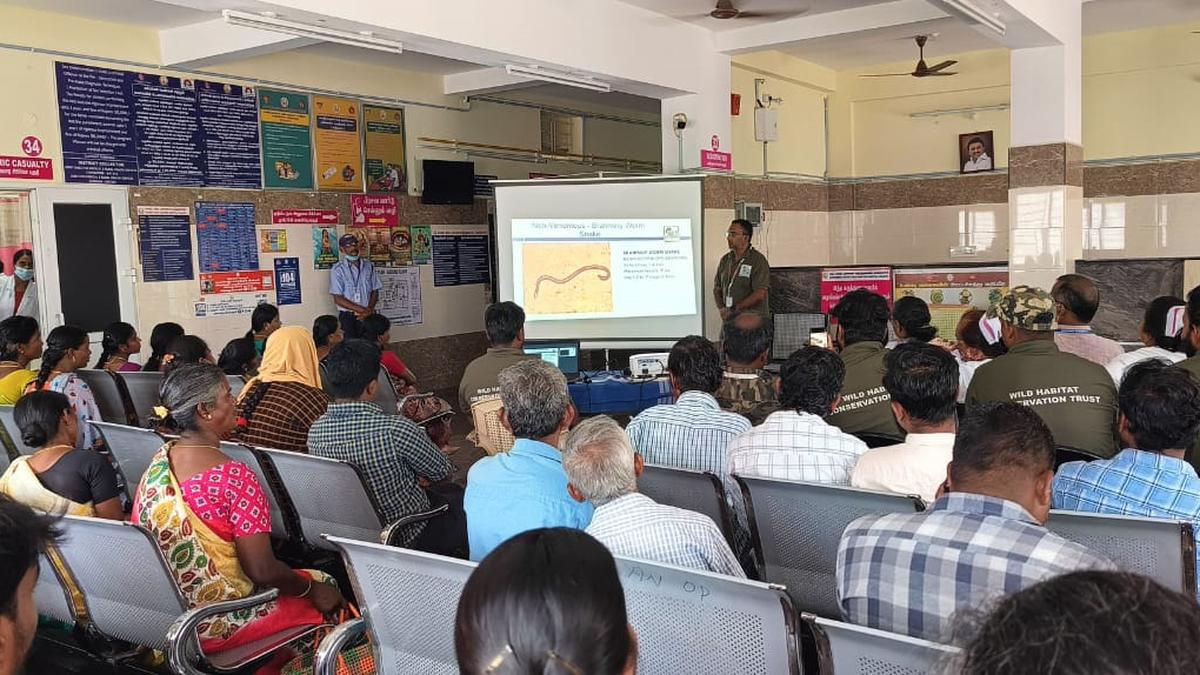
Medical professionals, public educated on snakes of the region at Government Headquarters Hospital, Pollachi
The Hindu
Hosp. in Pollachi rec. 201 snakebite cases this yr. Awareness session held to educate public on identifying venomous/non-venomous snakes, bite marks & dos/don'ts. Venomous snakes like spectacled cobra, common krait, Russell's viper & saw-scaled viper found in region. Hosp. staff trained to handle emergencies & initiate treatment swiftly.
COIMBATOREThe Government District Headquarters Hospital, Pollachi, is receiving cases of snakebites every other day, on an average, as a total of 201 persons who had snakebite were admitted to the hospital so far this year. However, the majority of the victims were unable to identify the snake that bit them, according to the hospital administration.
To educate the medical professionals and the public about snakes of the region, the hospital in association with the Wild Habitat Conservation Trust organised an awareness session as part of observing the International Snakebite Awareness Day on Tuesday.
“Victims of snakebites often come to the hospital without identifying the snake. In a few cases, they bring the snake or elders who accompany them tell the name of the snake. Knowing the type of snake that inflicted the bite will help doctors initiate the right treatment as soon as the patients arrive,” says S. Vanaja, Head of the Department of Medicine.
According to her, the hospital receives bite victims of vipers (russell’s viper and saw-scaled viper) the most. She said the hospital has adequate stocks of anti-venom to handle bites for four major venomous snakes, namely spectacled cobra, common krait, russell’s viper and saw-scaled viper.
“The awareness session mainly aimed at educating people on identifying venomous and non-venomous snakes, how to identify their bite marks and the dos and don’ts to be followed in case of a snake bite,” said S.A. Syed Aamir from Wild Habitat Conservation Trust.
According to him, places in the Pollachi region such as Anamalai, Valparai, Aliyar and Udumalpet have a high presence of snakes due to the geographic conditions. People should be careful about spectacled cobra, common krait, Russell’s viper and saw-scaled viper in these places as they live in human habitations and agricultural fields, he added.

“Writing, in general, is a very solitary process,” says Yauvanika Chopra, Associate Director at The New India Foundation (NIF), which, earlier this year, announced the 12th edition of its NIF Book Fellowships for research and scholarship about Indian history after Independence. While authors, in general, are built for it, it can still get very lonely, says Chopra, pointing out that the fellowship’s community support is as valuable as the monetary benefits it offers. “There is a solid community of NIF fellows, trustees, language experts, jury members, all of whom are incredibly competent,” she says. “They really help make authors feel supported from manuscript to publication, so you never feel like you’re struggling through isolation.”

Several principals of government and private schools in Delhi on Tuesday said the Directorate of Education (DoE) circular from a day earlier, directing schools to conduct classes in ‘hybrid’ mode, had caused confusion regarding day-to-day operations as they did not know how many students would return to school from Wednesday and how would teachers instruct in two modes — online and in person — at once. The DoE circular on Monday had also stated that the option to “exercise online mode of education, wherever available, shall vest with the students and their guardians”. Several schoolteachers also expressed confusion regarding the DoE order. A government schoolteacher said he was unsure of how to cope with the resumption of physical classes, given that the order directing government offices to ensure that 50% of the employees work from home is still in place. On Monday, the Commission for Air Quality Management in the National Capital Region and Adjoining Areas (CAQM) had, on the orders of the Supreme Court, directed schools in Delhi-NCR to shift classes to the hybrid mode, following which the DoE had issued the circular. The court had urged the Centre’s pollution watchdog to consider restarting physical classes due to many students missing out on the mid-day meals and lacking the necessary means to attend classes online. The CAQM had, on November 20, asked schools in Delhi-NCR to shift to the online mode of teaching.









